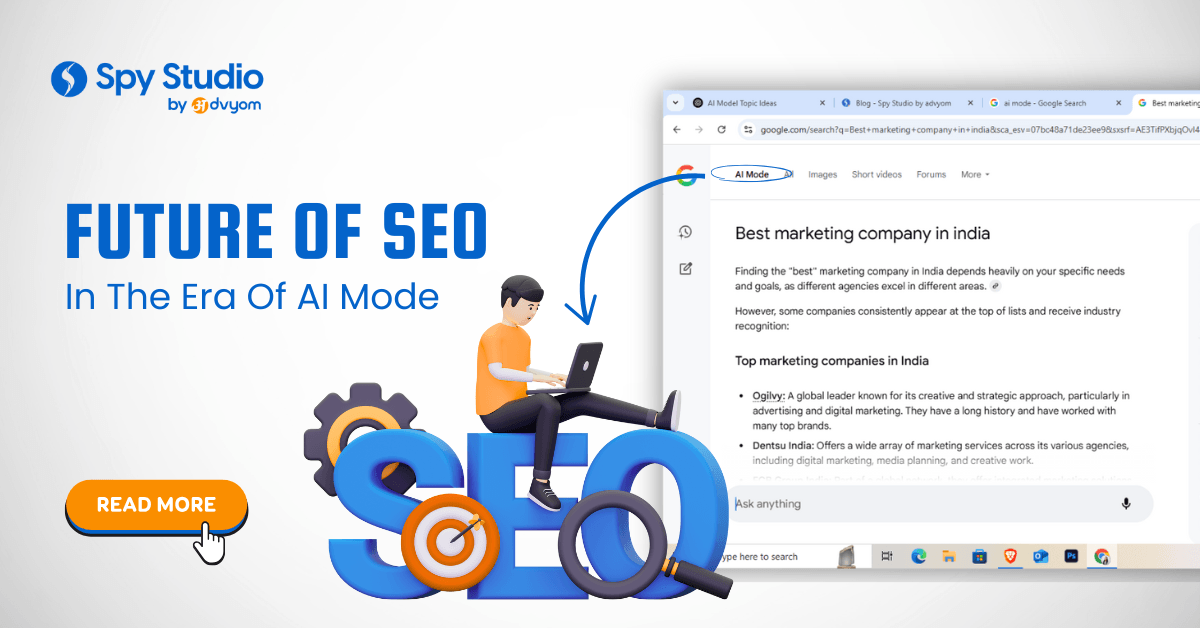What is Google AI Search Mode?
If you’ve used Google recently and noticed a smart, summarized answer at the top of your results, that’s part of Google’s Search Generative Experience (SGE), powered by AI. It’s not just showing links anymore, it’s thinking, summarizing, and sometimes even recommending what to do next.
Google AI Mode uses Generative AI to understand your search query in-depth and provides contextual answers pulled from across the web. It’s like ChatGPT inside Google, mixed with search intelligence.
Real Queries People Are Typing Today
Let’s look at what people are searching for and how AI is changing the way Google responds:
“Best way to grow on Instagram in 2025”
AI Summary appears with top 3 strategies, followed by links.
“I have a cold and sore throat. What should I take?”
AI gives suggestions with symptoms, possible causes, and OTC meds (with a disclaimer).
“Should I choose a hybrid or electric car for city use?”
AI compares both options, fuel savings, maintenance costs, and carbon footprint.
In the past, you’d have to click through 5–6 articles. Now, AI condenses it instantly but what happens to those articles?
What This Means for Traditional SEO
Let’s be real, Organic traffic is at risk. Here’s what’s changing fast:
1. Click-Through Rates (CTR) May Drop
With AI summaries giving instant answers, users may not click through to your site even if you rank #1.
Think: What’s the point of writing a blog if Google just uses my content and nobody clicks?
2. Topical Authority Matters More Than Keywords
Google’s AI isn’t just keyword-focused. It looks at content depth, relevance, and context.
You can’t just stuff “best digital marketing agency” 15 times and hope to rank.
3. Structured Content = Better AI Understanding
AI loves clarity. Headers, bullet points, FAQs, and schema markup all help your content get picked for those AI snippets.
How to Adapt Your SEO Strategy in the AI Era
“So… should I still do SEO in 2025?”
Absolutely. But you need to level up your game. Here’s how:
1. Focus on E-E-A-T
(Experience, Expertise, Authoritativeness, Trust)
Show real-world experience, author bios, and updated sources.
2. Write for People, Not Just Algorithms
Google AI now understands human tone. Use natural language, like you’re talking to a friend.
3. Optimize for Featured Snippets & AI Picks
Use questions as headers. Give direct, clear answers. Use “People Also Ask” format.
Example:
Q: What is a digital marketing funnel?
A: A digital marketing funnel describes the customer journey from awareness to conversion…
4. Add Unique Value Don’t Just Summarize What’s Out There
AI can generate summaries. But it can’t give real opinions, experiences, or case studies like you can.
The Silver Lining: New SEO Opportunities
It’s not all doom and gloom.
1. Get Picked for AI Summaries
If your content is well-structured and authoritative, Google AI might use your site as a source, even if you’re not in position 1.
2. Voice & Conversational SEO
AI Mode is conversational. Optimize for long-tail, natural queries like:
“What’s the best logo color for a tech startup?”
“How can I grow a personal brand as a freelancer in India?”
3. Multi-Modal SEO
Think: Search through text + image + voice. Your SEO now needs to cover visuals, alt text, video transcripts, etc.
Final Thoughts
Google AI Search Mode is changing the game, but SEO is not dead. It’s evolving.
If you’re a business, brand, blogger, or content creator, this is your moment to adapt, humanize your content, and provide real insights, not just generic fluff.
Because in the era of AI, authenticity wins. Think Like a Human & Act Like an AI this is the right strategy for nowadays SEO Wins.
FAQ's For Clear Thoughts :
What is Google AI Search Mode?
Is SEO still relevant in the era of Google AI Search?
How does AI Search Mode impact website traffic?
What should I change in my SEO strategy for AI Search?
Can my blog be picked up by Google’s AI summaries?
What are the new SEO opportunities with AI Search?
How do I check if my blog supports rich results in AI Search?
Curious about how AI is flipping SEO on its head? So is the writer of this blog a digital marketing enthusiast with a love for strategy, design, and content that connects? Expect real talk, fresh insights, and zero fluff.




